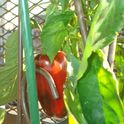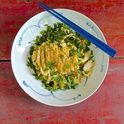Can I use all purpose flour?

Recipe question for:
Ima's Challah
7 Comments
sonyaAugust 10, 2015
If the recipe calls for bread flour, you'll need to add a little more water if you substitute all-purpose, and your bread will be a little less chewy.
creamteaJuly 20, 2015
You can use all-purpose flour; I use bread flour, or a blend of mostly bread flour and a small amount of all-purpose flour; bread flour or a combination of the two gives a better, stretchier texture.
PieceOfLayerCakeJuly 20, 2015
I would definitely use mostly, all-purpose flour (or bread flour) in a recipe for a free-form bread. I find using exclusively whole wheat flours can be tricky with bread since the bran can interfere with gluten development. Since challah is enriched, which further inhibits gluten, I would suggest using all-purpose (especially since you want strength but softness). If I'm experimenting with alternative flours, I will start with ¼ substitutions and increase/decrease from there.
creamteaJuly 20, 2015
Challah itself is not an Easter bread; rather, the word "challah" is a biblical Hebrew term denoting the double loaves of bread over which a blessing is recited at the Sabbath meal. They represent the double portion of mannah that was provided for the children of Israel during the Sabbath; it also refers to the soft, egg-based, often braided loaf typically used for that purpose (although other versions, such as water challah, a white loaf, are popular as well). Although there are sweet eggy breads in other cultures, challah is traditionally dairy-free to permit its inclusion in meat meals, since the combination of meat and dairy is not allowed.
ChefJuneJuly 17, 2015
How fascinating, Cynthia! I come from a mixed family, but none of my Gentile relatives have ever made or even eaten Challah unless they visited us. And I've never heard of it as an Easter Bread. Jews eat it year around, except at Passover when flour and yeast are not allowed. And unless it's to be specifically for a Dairy meal neither milk nor butter is included. When I put milk and butter in my Challah recipe, it becomes Brioche!
boulangereJuly 17, 2015
Here is my take on Challah: https://thesolitarycook.wordpress.com/2012/04/07/challah-with-herbs/
ChefJuneJuly 16, 2015
I've been making Challah for close to 50 years, and I'm not sure what else you would use! I am particular about using organic flour, but unbleached, all purpose is all I've ever used -- with great success, I might add. ;)
Showing 7 out of 7 Comments
Recommended by Food52
Popular on Food52
Continue After Advertisement



